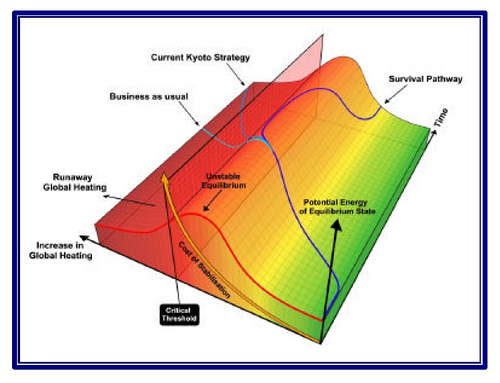|
Despite the claims of Climate Change Sceptics to the contrary, 98% of scientists agree that climate change is anthropogenic and caused largely by emissions of carbon dioxide and other potent greenhouse gases. The fourth report of the Intergovernmental Panel on Climate Change (IPCC) gave warnings that unless action is taken to keep warming below 2°C, positive feedbacks (tipping points) that we cannot control are likely to be activated, leading to unstoppable/runaway climate change that will have devastating impacts on the planet and its people.
The graph below shows the path of current Kyoto strategy which takes us over the red tipping point (using IPCC's most recent reports) and into 'runaway' or unstoppable climate change (caused by a number of natural knock on effects or 'positive feedbacks' which kick in once a certain carbon concentration is reached). The action needed to address this devastating threat is rapid carbon descent, translating into deep cuts in the activities of carbon heavy industries and energy production, and a matching decrease in consumption.
The Copenhagen Diagnosis, a scientific document prepared for the Copenhagen climate summit in 2009 concluded 'that several important aspects of climate change are already occurring at the high end, or even beyond, the expectations of just a few years ago'. It asserted that:
- "by 2020 industrial nations must reduce their greenhouse gas emissions by around 40% below 1990 levels to secure a decent chance of avoiding dangerous human interference with the climate system."
The report also found that global ice sheets are melting at an increased rate; Arctic sea ice is thinning and melting much faster than recently projected, and future sea-level rise is now expected to be much higher than previously forecast. Without significant mitigation, the report concluded that global mean warming could reach as high as 7 degrees Celsius by 2100.
Despite these predictions, the 15th Conference of the Parties to the United Nations Framework Conventions on Climate Change, or COP15, in Copenhagen 2009, failed to agree to any binding emissions reduction targets to take the place of the Kyoto protocol. The Kyoto protocol itself has been criticised as unambitious and ineffective, and has certainly failed to achieve any meaningful cuts worldwide. Lumumba Di-Aping, chief negotiator for the G77 group of 130 developing countries, called the conference outcome 'nothing short of climate change scepticism in action', adding 'It locks countries into a cycle of poverty for ever'[1].
The UK has been congratulated for having the most ambitious emissions reduction targets in the world, aiming for 80% cuts from 1990 levels by 2050 (which will give us a 50:50 chance of avoiding the worst predications [2]). However, over the last 10 years British emissions have actually increased, and there is little sign that the drastic changes needed to meet this target are being made, leading to accusations that the targets are 'all politics' and no substance.
International agreements, and Britain's policies, rely on market based solutions to reduce emissions. Central to this is the notion of Carbon Trading, which allows polluting industries to continue emitting, as long as they pay for someone else to curb emissions elsewhere. This method has been encouraged by many industries who see this as the cheapest and easiest option, especially as many have received exemptions from payment. Market based solutions such as the 'cap and trade' scheme have been heavily criticised by a range of commentators (see recommended reading), and have so far failed to deliver any reductions.
Meanwhile public denial and disillusionment about climate change in Britain is on the increase, a manifestation of hopelessness and apathy about finding solutions to the issue, perpetuated by ineffective government strategies, which have historically targeted individual behaviour over polluting industry. Only 41% of those surveyed by a recent Times newspaper poll believed climate change was anthropogenic (man made) despite established science to the contrary[3].
| 
